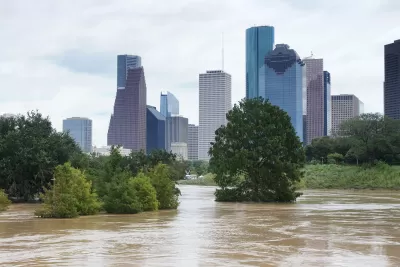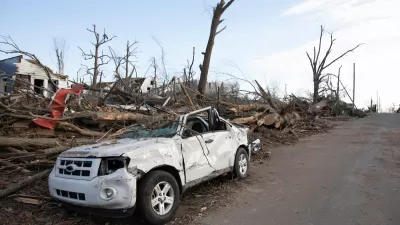The changes make it easier for households facing evacuation to access relocation funds.

The Federal Emergency Management Agency (FEMA) is making changes to its disaster assistance program that aim to expand immediate cash payments to people affected by natural disasters and assist households who face financial barriers to evacuation, reports Willy Blackmore in Word In Black.
Evacuation can often be costly for families: “when Hurricane Harvey hit Houston in 2017, researchers found that it cost households $1200, on average, to ride out the storm elsewhere (including lost wages) — more, if they didn’t have a free place to stay and had to sleep in a hotel. The FEMA payments, however, are only $750 per household.”
The new rules call for providing up-front assistance for various types of housing options, including rental housing and the cost of staying with family or friends. “If a lack of cash makes it difficult to get out before a storm, the long-term effects on the housing market are what often force people away for good — the new disaster assistance program could at least help mitigate that somewhat.”
FULL STORY: New Disaster Assistance May Make it Easier for Black People to Evacuate

Maui's Vacation Rental Debate Turns Ugly
Verbal attacks, misinformation campaigns and fistfights plague a high-stakes debate to convert thousands of vacation rentals into long-term housing.

Planetizen Federal Action Tracker
A weekly monitor of how Trump’s orders and actions are impacting planners and planning in America.

In Urban Planning, AI Prompting Could be the New Design Thinking
Creativity has long been key to great urban design. What if we see AI as our new creative partner?

Massachusetts Budget Helps Close MBTA Budget Gap
The budget signed by Gov. Maura Healey includes $470 million in MBTA funding for the next fiscal year.

Milwaukee Launches Vision Zero Plan
Seven years after the city signed its Complete Streets Policy, the city is doubling down on its efforts to eliminate traffic deaths.

Portland Raises Parking Fees to Pay for Street Maintenance
The city is struggling to bridge a massive budget gap at the Bureau of Transportation, which largely depleted its reserves during the Civd-19 pandemic.
Urban Design for Planners 1: Software Tools
This six-course series explores essential urban design concepts using open source software and equips planners with the tools they need to participate fully in the urban design process.
Planning for Universal Design
Learn the tools for implementing Universal Design in planning regulations.
Gallatin County Department of Planning & Community Development
Heyer Gruel & Associates PA
JM Goldson LLC
City of Camden Redevelopment Agency
City of Astoria
Transportation Research & Education Center (TREC) at Portland State University
Jefferson Parish Government
Camden Redevelopment Agency
City of Claremont





























